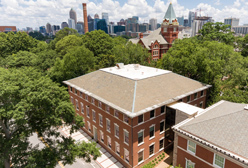New Sponsored Research
Celia Pearce, associate professor in the School of Literature, Communication, and Culture Graduate Program in Digital Media, has been awarded $12,362 in supplemental support for "Determining Behavioral Indicators in Massive Multiplayer Online Games and Virtual Worlds."
Other Research Funding
Karen Head, assistant professor in the School of Literature, Communication, and Culture and director of The Communications Center, has been granted $9,914 under Georgia Tech's GTFIRE program for her proposal "Learning to Critique Designs through Public Speaking." Co-PI is Colin Potts in the College of Computing.
Books by Faculty
Basic Methods of Policy Analysis and Planning, Third Edition (Pearson) by Carl Patton, David Sawicki, and Jennifer Clark, associate professor in the School of Public Policy. The book presents quickly applied methods for analyzing and resolving planning and policy issues at state, regional, and urban levels.
What Does Georgia Tech Think?
Selected Press for Ivan Allen College of Liberal Arts
|
Hicks on Performance-Based University Research Funding
New research by Diana Hicks, professor and chair of the School of Public Policy, was featured in Science Magazine which summarized, "Although distribution of research funding is the putative purpose, direct financial impacts appear small compared to incentives to compete for public prestige. Some values widely associated with universities, such as diversity and equity, may suffer under systems focused solely on excellence and international competition." Source: Science Magazine (subscription only) - March 6, 2012
April 4, 2012 - April 7, 2012
8:00 pm
April 12, 2012 - April 13, 2012
9:00 am
|
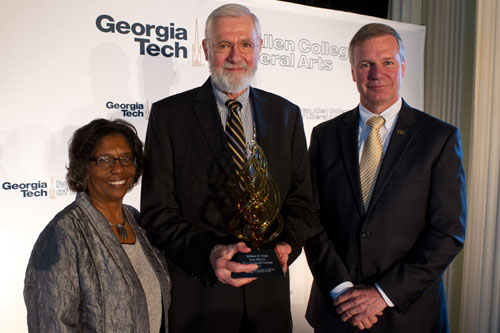
|
Allen Prize Recipient Urges Courage to Change Poverty
"The world health situation is both dire and correctable," said William H. Foege during a speech March 15 as Georgia Tech Ivan Allen College of Liberal Arts presented him with the Ivan Allen Jr. Prize for Social Courage. Foege pointed to poverty as the underlying problem saying, “People who are poor are subsidizing our way of life and we need to have the courage to change that.”
Dr. Foege was honored during the college’s 2012 Founder’s Day celebration on March 14 – 15th. Wednesday’s Allen Prize Symposium “Global Health and the Challenge of Hope” brought to campus the world’s leading influencers in the field. Moderator Dr. Mark Rosenberg, who is president and CEO of The Task Force for Global Health which Dr. Foege co-founded, highlighted Dr. Foege’s work in saving millions of lives, expanding the reach of public health, and forging a new concept of global health equity.
“Dr. Foege, more than any other single person, helped create the field of endeavor we now call global health and is the preeminent figure in the field today,” said Rosenberg. “His work eradicating smallpox, vaccine-preventable diseases of children, and other health problems of poor people and poor countries are just the visible signs of a much deeper and more fundamental influence he has had around the world. For him, improving public health, especially for people living in poverty, is one of the most effective means for promoting social and economic equity and with that, peace.”
Symposium participants were President Jimmy Carter of The Carter Center, Dr. David Addiss who directs the Children Without Worms program at The Task Force for Global Health, and Dr. Helene Gayle, president and CEO of CARE USA, each of whom spoke via recorded remarks, as well as, Dr. James Curran, Dean of the Rollins School for Public Health at Emory University; Dázon Dixon Diallo, founder and president of SisterLove, Inc.; Dr. Jeffrey Koplan, director of the Global Health Institute at Emory; Dr. David Satcher, former U.S. Surgeon General and director of the Satcher Health Leadership Institute at Morehouse Medical College; and Dr. Foege.
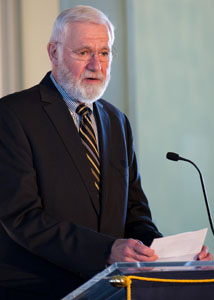 An epidemiologist, Dr. Foege’s sixty-year career has included leadership roles at U.S. and world health organizations including the Centers for Disease Control and Prevention (CDC), The Carter Center, the Bill & Melinda Gates Foundation, and The Task Force for Global Health. He was honored by Georgia Tech as an insistent and courageous voice for change who has often taken controversial positions and actions. For example, Dr. Foege’s discovery of the surveillance/containment vaccination strategy was crucial to the eradication of smallpox, but equally important were the intercultural skills he employed to overcome resistance to the new vaccination strategy. Dr. Foege is credited with moving forward the first mass pharmaceutical philanthropy effort. In contradiction to directions from the World Health Organization and other groups, he accepted Merck's offer to donate heart worm medicine for the treatment of worms in children. The program was hugely successful and established a precedent for today's expanding pharmaceutical - global public health partnerships. An epidemiologist, Dr. Foege’s sixty-year career has included leadership roles at U.S. and world health organizations including the Centers for Disease Control and Prevention (CDC), The Carter Center, the Bill & Melinda Gates Foundation, and The Task Force for Global Health. He was honored by Georgia Tech as an insistent and courageous voice for change who has often taken controversial positions and actions. For example, Dr. Foege’s discovery of the surveillance/containment vaccination strategy was crucial to the eradication of smallpox, but equally important were the intercultural skills he employed to overcome resistance to the new vaccination strategy. Dr. Foege is credited with moving forward the first mass pharmaceutical philanthropy effort. In contradiction to directions from the World Health Organization and other groups, he accepted Merck's offer to donate heart worm medicine for the treatment of worms in children. The program was hugely successful and established a precedent for today's expanding pharmaceutical - global public health partnerships.
Though he avoids credit, Dr. Foege’s is recognized as one of the science heroes who have saved the most lives in the world and for achieving extraordinary progress across an astonishing breadth of health issues including disease eradication and control, child survival and development, injury prevention, population control, preventive medicine, poverty, and tobacco-related diseases.
In remarks directed especially to students, Dr. Foege said, “Absolutely love science, but don’t worship it. There is something better, and that is science in the service of humanity, a science of equity, and science distributed with compassion.”
Dr. Foege asked students to think beyond financial rewards. “If you want real power, think beyond yourself, your nation, and even your time in the world. Think of using your time to change the future.”
This Founder’s Day marked the 50th anniversary of the inauguration of Ivan Allen, Jr. as mayor of Atlanta and highlighted ongoing research, teaching, and service in the college in the dimensions of his visionary urban policies and his values of social courage, social justice, and ethical action. The Allen family was present for the celebration.
Events on the 15th began with a research roundtable “Compassion and Health” presented by college and Institute faculty. The panel “Health and Humanitarian Goals” was moderated by IAC Public Policy alumna, Lynn Austin, who is deputy director of the Office of Public Health Preparedness and Response at the Centers for Disease Control and Prevention. Presenters were Dr. Anne Pollock (LCC), Dr. Jennifer Singh (HTS), and Dr. Julie Swann (ISyE). William J. Todd (CoM), a recipient of the Ivan Allen Jr. Prize for Progress and Service and a Georgia healthcare leader, moderated the panel “Healthcare Policy and Economics” with presenters Dr. Vivek Ghosal (ECON), Dr. Kimberly Isett (PubPol), and Dr. Aaron Levine (PubPol).
Editors Note: On April 26, 2012, President Obama named Dr. Foege as a recipient of the Presidental Medal of Freedom, which is the nation's highest civilian honor.
2012 Founder's Day Videos including the Allen Prize Symposium
Top Photo: Dr. Foege (center) with Dean Jacqueline Royster (l) and President G. P. "Bud" Peterson
|
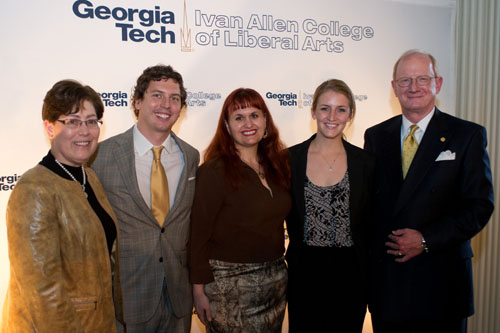
|
2012 Ivan Allen Jr. Legacy Awards Presented
Alumnus Alex West, Dr. Margaret Kosal, and students Kate Wharton and Nettrice Gaskins were presented Ivan Allen Jr. Legacy Awards during the Ivan Allen College of Liberal Arts Founder's Day luncheon on March 15 at The Biltmore.
The Allen Legacy Awards honor faculty, students, and alumni as innovators who are shattering traditional boundaries to create solutions that are deliberately interdisciplinary, socially responsible, and ethically conscious, and who are courageously advancing the cause of social justice. Their character and work embody the values and principles that were demonstrated so inspiringly by the college's founding namesake, former Atlanta Mayor Ivan Allen, Jr.
"By conferring these awards, we demonstrate that Mayor Allen's values and principles remain resoundingly relevent in our time," said Dean Jacqueline J. Royster. "I can tell you with pride that we are never lacking for oustanding candidates for these awards."
Maggie Kosal, assistant professor in The Sam Nunn School of International Affairs, was recognized for her extraordinary work in counterterrorism and security issues.
Alex West, an alumnus of the School of Literature, Communication, and Culture (LCC) Computational Media program, was recognized for his leadership of the nonoprofit, WonderRoot, which brings art for social change to communities.
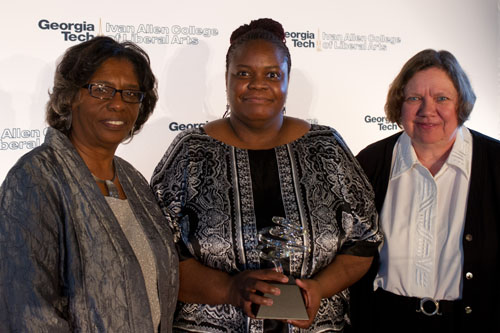 LCC PhD candidate Nettrice Gaskins was recognized for her research on culturally-situated game-based learning to involve under-represented groups in science and math and on technological effects on black culture and art. LCC PhD candidate Nettrice Gaskins was recognized for her research on culturally-situated game-based learning to involve under-represented groups in science and math and on technological effects on black culture and art.
Kate Wharton, an undergraduate studet in the Economics and International Affairs degree program, was recognized for her leadership of AISEC Georgia Tech, and for humanitarian works including research on microfinance as a tool for alleviating poverty, originating "Volunteer for Bangladesh," and work as part of a team that designed a refugee camp sanitation system.
The Ivan Allen Jr. Legacy Awards are made possible through the generosity of Col. Stephen and Mrs. Pamela Hall.
Top Photo (l to r): Pam Hall, Alex West, Maggie Kosal, Kate Wharton, Steve Hall
Second Photo (l to r): Dean Royster, Nettrice Gaskins, Associate Dean Susan Cozzens
IAC 2012 Founder's Day Videos
Legacy Awards
|
2012 Nunn Policy Forum to Focus on Energy Security
The 2012 Sam Nunn Bank of America Policy Forum on April 16 brings to Georgia Tech an important dialog on energy security.
A distinguished roster of speakers are participating in the forum "Energy and Security: Global Challenges/Local Opportunities." The keynote will be provided by Dr. Daniel Yergin, Chairman and Founder, IHS Cambridge Research Associates. Among the participants are Dr. Ashton Carter, US Deputy Secretary of Defense; General James Jones, USMC (retired), former US National Security Advisor; Major General Robert H. McMahon, Commander, Warner Robins Air Logistics Center, and Senator Sam Nunn, co-chairman and CEO of the Nuclear Threat Initiative and distinguished professor in The Sam Nunn School of International Affairs. Panels will discuss U.S. choices in the changing international energy landscape and trends and issues in U.S. energy security including the southeast region.
Held biennially, the Nunn Policy Forum is designed to connect the academic and policymaking communities to craft effective and creative responses to critical challenges confronting the United States in the twenty-first century.
The forum is open to the public. View the full program and register.
|
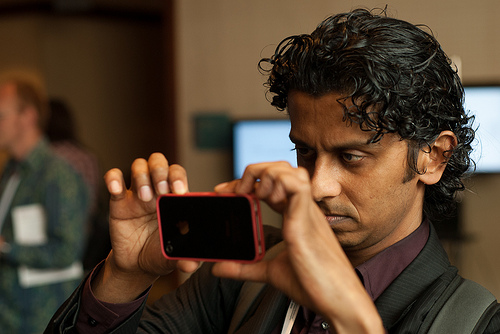
|
International Information and Communications Technologies Conference Convenes at Georgia Tech
Hundreds of people from all over the world attended the Fifth International Conference on Information and Communication Technologies and Development (ICTD2012) hosted on campus March 12-15 by the Ivan Allen College of Liberal Arts and the College of Computing.
ICTD is the world's premier conference examining the role of computers and communications in social, economic, and political development. According to conference co-chair Mike Best, associate professor in The Sam Nunn School of International Affairs, the world really came to the Georgia Tech campus for the four day event.
“We had significant delegations from Africa and Asia and representations from Australia, the Caribbean, and Latin America. Of course we also had attendees from across the USA.”
Central themes that emerged included the explosive growth of mobile telephones worldwide and the development of innovative applications on mobile handsets, the continued need for robust and inclusive methods that match computing systems with real needs and local realities, and the sustained enthusiasm demonstrated globally for internet-enabled services.
Beyond geographic diversity, the conference attracted a broad range of scholars and practitioners including university researchers, members of international organizations such as the World Bank, senior government officials, and members of civil society. There were over fifty panels and workshops, twenty-nine technical demonstrations, and thirty-eight peer-reviewed papers in plenary and poster presentation. Keynote presentations included the Honorable Omobola Johnson, Minister of Communication and Technology, Federal Republic of Nigeria, who discussed the role of computers and communications in Nigerian development.
The conference was co-chaired Ellen Zegura in the College of Computing.
Photos by Bence Kollanyi
|
Elliott Appointed to National Research Council Committee
|
|
Michael Elliott has been appointed to the National Research Council’s Committee on Inherently Safer Chemical Processes. Elliott is an associate professor jointly appointed in the School of Public Policy and the College of Architecture School of City and Regional Planning. The committee is examining approaches used by chemical manufacturing facilities for the management of chemical process risks, especially in the use of particularly hazardous chemicals, and in the potential for replacing risky processes with inherently safer ones. |
Assessing the Assessments: Hicks’ Examines Performance Based University Research Funding
|
|
Though a modern-day Galileo may still woo an occasional Medici patron to support his research, a vast number of scientists depend on much more bureaucratic means to keep their labs running. Since
1986, when the UK Research Assessment Exercise was launched, at least 14
countries have implemented systems to distribute research funding to
universities based on evaluation of research output. These have been motivated
by the increasing importance of research to economic growth, as well as broader
interests in improving public management. [School of Public Policy professor
and chair, Diana Hicks] analyzes the systems’ rationale, design, and impact.
There is a range of assessments (e.g., citation analysis, peer review), across
a range of scales (e.g., university, department, individual), that affect a range
of funding outcomes (e.g., 25% of UK research support, 2% of Italian block
grants). Although distribution of research funding is the putative purpose,
direct financial impacts appear small compared to incentives to compete for
public prestige. Some values widely associated with universities, such as
diversity and equity, may suffer under systems focused solely on excellence and
international competition. Though touted as critical to economic success, the
systems do not appear to be well designed to meet that goal. Hicks, D., Performance-based university research funding systems. Res. Policy (2012), 41, 251-261 doi:10.1016/j.respol.2011.09.007 – Source: Science, Editor’s Choice, March 6,
2012
|

|
TECHStyle! Blog/Magazine Features Innovation in Digital Pedagogy
Three articles from TECHStyle! were highlighted in the Chronicle of Education’s March 1 edition of ProfHacker's Teaching Carnival. The TECHStyle! blog/magazine showcases the leading-edge digital pedagogy and research being done by the Ivan Allen College of Liberal Arts Brittain Fellows.
The Brittain Fellows, all of whom are PhDs, teach first-year composition and technical communication to Georgia Tech students through the Writing and Communication Program housed in the IAC School of Literature, Communication, and Culture. Topics in their TECHStyle! e-pub span teaching, research, technology, and life in academics, and include posts ranging from scholarly articles in development to brief reflections on new teaching strategies. Check out the articles selected for the ProfHacker column:
Photo by: askpang on flickr
|
INTA PhD Students Selected for Prestigious Programs
Three students in the International Affairs, Science, and Technology doctoral program in The Sam Nunn School of International Affairs have been honored with prestigious opportunities and awards.
Yujia He and Ayodegi Fajebe were selected to participate in the George Washington University Center for International Business and Education Research (CIBER) Summer Doctoral Institute for 2012. Diane Alleva Cáceres has been granted the 2011-2012 Canadian Studies Doctoral Student Research Award (Dissertation Grant).
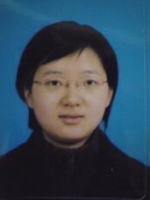 He obtained a B.S. in chemistry from Peking University in China and was a pre-doctoral fellow in the Sam Nunn Security Program in 2009 - 2010. Her research interests are international political economy, economic development, industrial policies, and technology policies. In particular, she is studying the drivers and the consequences of economic development in China, Japan, and other East Asian economies. She has conducted research and presented papers on municipal solid waste generation and the policies of municipal solid waste management in rapidly developing emerging economies. He obtained a B.S. in chemistry from Peking University in China and was a pre-doctoral fellow in the Sam Nunn Security Program in 2009 - 2010. Her research interests are international political economy, economic development, industrial policies, and technology policies. In particular, she is studying the drivers and the consequences of economic development in China, Japan, and other East Asian economies. She has conducted research and presented papers on municipal solid waste generation and the policies of municipal solid waste management in rapidly developing emerging economies.
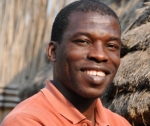 Fajebe earned a B.S in Electrical Engineering from the University of Lagos, Nigeria and Master’s degrees in Electrical and Computer Engineering from the University of Waterloo, Canada, and the University of Oklahoma. His research interests are at the intersection of information and communication technologies and international development. He is also interested in the role of other technologies in international security and computational analysis and modeling of social systems. Fajebe earned a B.S in Electrical Engineering from the University of Lagos, Nigeria and Master’s degrees in Electrical and Computer Engineering from the University of Waterloo, Canada, and the University of Oklahoma. His research interests are at the intersection of information and communication technologies and international development. He is also interested in the role of other technologies in international security and computational analysis and modeling of social systems.
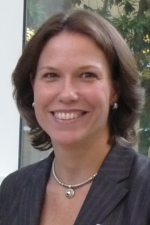 Alleva Cáceres received her B.A. in Economics and M.A. in Government from the College of William and Mary in Virginia. She has twenty years of experience in international trade, investment, and economic development working with the Woodrow Wilson International Center for Scholars' Asia Program, the World Technology Foundation, the Australian Trade Commission, and the U.S. Agency for International Development's Center for Trade and Investment Services covering North Africa and the Middle East. She also established an international trade and investment consulting practice, Market Access International, Inc. Her research focuses on questions of economic development and the role of the state, institutions and the firm in science and technology-driven industries. Specific areas of interest include innovation, international trade, foreign direct investment (FDI), regionalism, comparative political economy, international political economy, technology transfer, globalization, industry studies and strategic management. She is a MacArthur and Sam Nunn Security Fellow and a life member of the Council on Foreign Relations. Her recent work examines networked polities at the sub-national level in bioscience. Alleva Cáceres received her B.A. in Economics and M.A. in Government from the College of William and Mary in Virginia. She has twenty years of experience in international trade, investment, and economic development working with the Woodrow Wilson International Center for Scholars' Asia Program, the World Technology Foundation, the Australian Trade Commission, and the U.S. Agency for International Development's Center for Trade and Investment Services covering North Africa and the Middle East. She also established an international trade and investment consulting practice, Market Access International, Inc. Her research focuses on questions of economic development and the role of the state, institutions and the firm in science and technology-driven industries. Specific areas of interest include innovation, international trade, foreign direct investment (FDI), regionalism, comparative political economy, international political economy, technology transfer, globalization, industry studies and strategic management. She is a MacArthur and Sam Nunn Security Fellow and a life member of the Council on Foreign Relations. Her recent work examines networked polities at the sub-national level in bioscience.
|
Fort McPherson Community Planning Project Wins AICP Student Project Award
|
|
School of Public Policy alumna, Neela Ram, was part of the team that has won the 2012 American Institute of Certified Planners (AICP) Student Project Award for Contribution of Planning to Contemporary Issues. Ram, who earned master's in both Public Policy (2010) and the College of Architecture's School of City and Regional Planning, is currently senior environmental planner at the Atlanta Regional Commission. The project, Action Plan for the Fort McPherson Community, was prepared under the direction of CoA Professor Michael Dobbins and students in his studio in the School of City and Regional Planning. Fort McPherson is a 488-acre army base in the City of Atlanta designated for closure under the BRAC process. Leaders from mostly minority and low-wealth communities surrounding Fort McPherson asked Georgia Stand-UP, a "think- and act- tank for working families," to assist them in engaging the BRAC process. Georgia Tech's planning program provided technical assistance. The plan stressed job creation, a clear interim planning and operational strategy, and active reintegration of the base with the community, in part through engaging existing rail transit stations as Transit Oriented Developments. The winning project was completed in 2010 with support from the Ford Foundation and will be presented during the 2012 American Planning Association (APA) National Planning Conference in Los Angeles in April. |
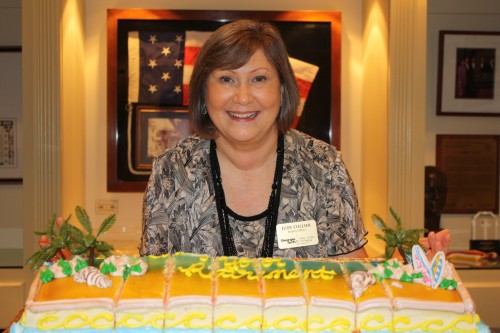
|
College Gathers for Fond Farewell to Judy Collier
Judy Collier, long-time dean’s assistant in the Ivan Allen College of Liberal Arts, retired March 30th bringing to a close a thirty year career with Georgia Tech.
Collier was hired in 1981 as a part-time clerk in the School of Electrical Engineering. She rose to responsibilities as staff assistant to the associate vice president of Academic Affairs, Dr. Jo Baker; the College of Engineering dean’s office under Narl Davidson; and the School of Material Science and Engineering chair’s office. In 1999, she was hired as assistant to the dean in the Ivan Allen College of Liberal Arts working with former dean Sue Rosser, and current dean, Jacqueline J. Royster.
The college presented Collier with an engraved vase. During a farewell event held March 28th, Collier told a large crowd of well-wishers gathered from across campus that while her time at Georgia Tech seemed “long on the front end” that, looking back, the time had gone too fast. She expressed heartfelt thanks to colleagues.
|
|

